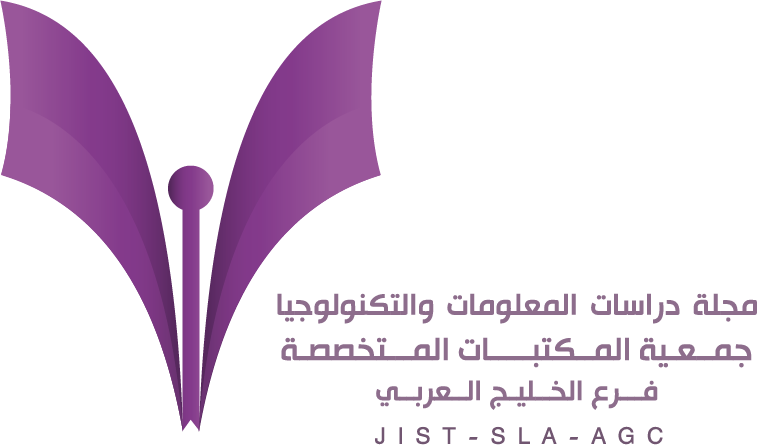-
oa متطلبات دخول المكتبات العمانية في عالم الثورة الصناعية الرابعة والتحديات التي تواجهها: المكتبة الرئيسية بجامعة السلطان قابوس أنموذجا
- Source: Journal of Information Studies & Technology (JIS&T), Volume 2020, Issue 2, Sep 2020, 8
-
- 08 April 2020
- 28 April 2020
- 30 September 2020
Abstract
ملخص
هدفت الدراسة إلى التعرف على متطلبات دخول المكتبات العمانية في عالم الثورة الصناعية الرابعة، والتحديات التي تواجهها. تم تناول المكتبة الرئيسية بجامعة السلطان قابوس كنموذج في هذه الدراسة باعتبارها أكبر المكتبات العمانية، وتم تحقيق ذلك بمجموعة من الأهداف الفرعية وهي:
• التعرف على متطلبات دخول قطاع المكتبات والمعلومات عالم الثورة الصناعية الرابعة.
• التعرف على جاهزية المكتبة الرئيسية بجامعة السلطان قابوس للدخول في عالم الثورة الصناعية الرابعة.
• التعرف على التحديات التي تواجه المكتبة الرئيسية بجامعة السلطان قابوس للدخول في عالم الثورة الصناعية الرابعة.
وقد استخدمت الدراسة المنهج المزجي لدراسة متطلبات دخول المكتبات العمانية في عالم الثورة الصناعية الرابعة، وقياس مدى جاهزية المكتبة الرئيسية بجامعة السلطان قابوس لها، وتسليط الضوء على التحديات التي تواجهها، إذ اعتمدت على الاستبانة والمقابلة شبه المقيدة في الحصول على المعلومات من عينة الدراسة المتمثلة في موظفي المكتبة الرئيسية.
أظهرت نتائج الدراسة إلى أن التجهيزات البشرية، والتقنية، والمالية، والتشريعية أهم متطلبات دخول المكتبات العمانية للثورة الصناعية الرابعة. كما تمتلك المكتبة الرئيسية بجامعة السلطان قابوس مستوى عالٍ من الجاهزية للدخول في عالم الثورة الصناعية الرابعة وتبين ذلك من خلال درجة وعي موظفي المكتبات، والاهتمام بالتدريب والتطوير، والتجهيزات التقنية والمالية، والجهود التي تبذلها المكتبة، بينما يمثل التحدي المالي، والتحدي التقني، وتعقيد الإجراءات الإدارية، وتوعية الموظفين الإداريين لشؤن الجامعة والإدارة العليا من أهم التحديات التي تعيق إمكانية المكتبة في استخدام تقنيات الثورة الصناعية الرابعة.
خلصت الدراسة إلى مجموعة من التوصيات من أهمها الاطلاع على تجارب المكتبات في تطبيق تقنيات الثورة الصناعية الرابعة، وتخصيص جزء من الموازنة في شراء الأجهزة وتطبيق تقنيات الثورة الصناعية الرابعة، وإجراء المزيد من الدورات التدريبية وورش العمل للموظفين لرفع قدرتهم على استخدام الأجهزة والأنظمة الذكية، وإجراء المزيد من الدراسات المتعلقة بتأثير استخدام تطبيقات الثورة الصناعية الرابعة على الخدمات المعلوماتية.
The study aims to identify the requirements challenges for shifting the Omani libraries to the world of the Fourth Industrial Revolution (4IR). The main library of Sultan Qaboos University (SQU) was examined as a model as it is the largest Omani library while considering the following sub-objectives:
• Identify the requirements for the library and information sector to shift to the world of 4IR.
• Explore the readiness of this library to enter the world of 4IR.
• Identify the challenges faced by this library to enter the world of 4IR.
This study used the mixed methods approach. It measured the readiness of SQU main library and highlighted the challenges. The study relied on a questionnaire and semi-restricted interviews to collect information from this library's staff.
The results of the study showed that human readiness, technology, financial status and legislation are the most important elements for Omani libraries to enter the 4IR. A great effort is being made by SQU main library and it possesses a high level of readiness, i.e. the level of the library staff awareness, training & professional development, technology and financial status. The main challenges being faced are: the financial and technological issues, complexity of the administrative processes, lack of awareness of the university administration and management.
The study concluded with a set of recommendations: Learning how other libraries were able to access the 4IR, allocating part of the budget for purchasing new devices and technology, increasing staff training to enhance their ability to use smart devices and systems, conducting further studies of the impact of the 4IR applications on the Information Services.


